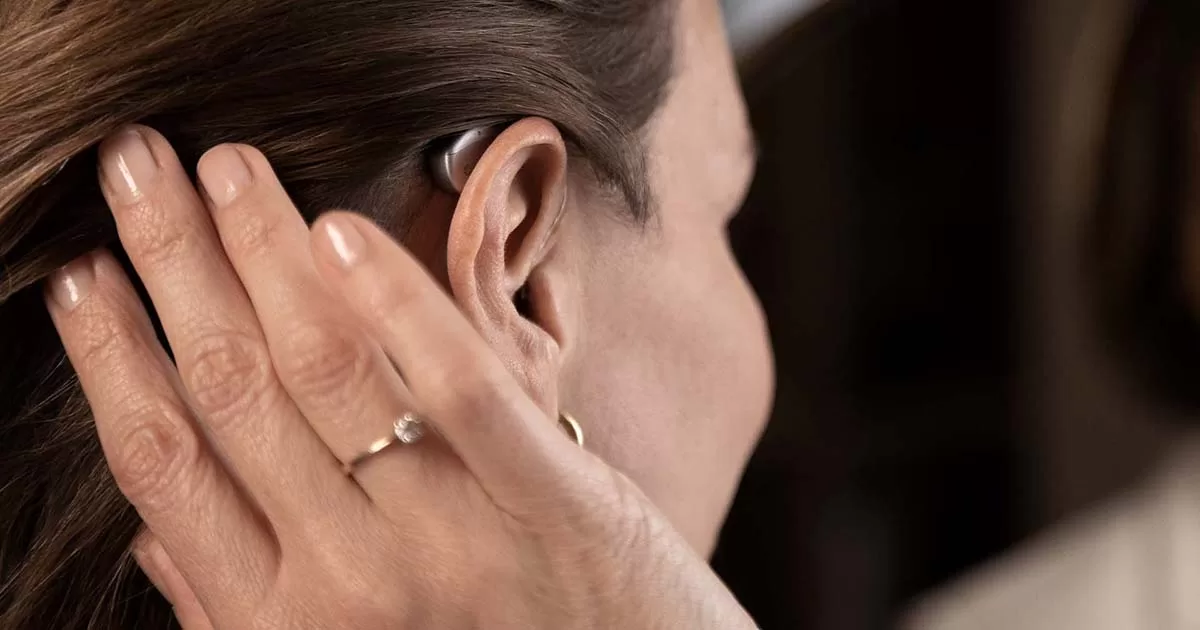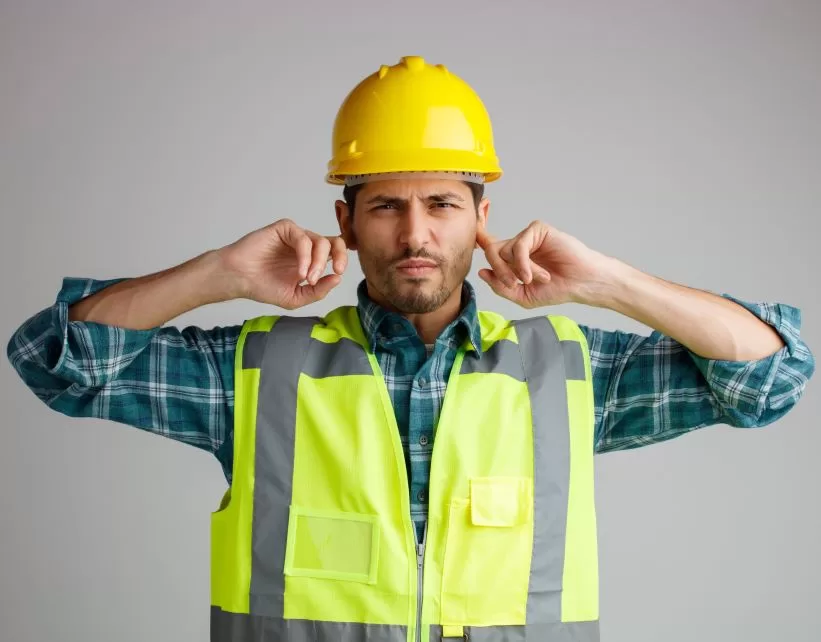Approximately 17% of people in Australia experience tinnitus. And for the majority of these people, tinnitus is an associated symptom of their hearing loss.
Did you know that hearing aids are a commonly used treatment option for tinnitus? If so, then you would know that hearing aids have the ability to significantly improve tinnitus symptoms and have been known to correct them all together after regular use.
In this blog post we will discuss the best hearing aids available to assist with tinnitus as well as some other tinnitus therapy options available that can be integrated into your treatment.
Content Navigation
What Is Tinnitus?
Tinnitus is defined as the perception of a sound when no external sound source is present. Patients often describe it as “ringing in the ears”, but it can also present itself as other phantom noises such as buzzing, hissing, humming or even music. The sound can either be heard bilaterally (in both ears) or unilaterally (in one ear) and, for many, can be quite annoying.
It is important to understand Tinnitus is a symptom and not an actual disease. It can result from a number of different conditions, and to ensure proper treatment options are considered, a consult with a hearing care professional is recommended prior to sourcing treatment.
Although tinnitus is typically associated with hearing loss there are a number of other conditions that can cause it to occur, such as:
- Build-Up of Ear Wax
- Head Trauma
- Brain Tumour
- Hearing Loss
- Stress
- Ageing
- Side Effect of Medications
- Exposure to Loud Noises
- Drug / Alcohol Use
As there is no single cause of tinnitus, there is no specific cure. That’s why it is important to seek medical advice from your hearing care professional and/or doctor prior to seeking treatment.
What Are the Best Hearing Aids for Tinnitus in Australia?
Although there are many causes of tinnitus, most commonly it is a related symptom of hearing loss. Thus, many of the hearing aid manufacturers offer tinnitus support built in to their devices, which can be used to assist in the tinnitus management process.
Hearing loss occurs when the acoustic signal travelling to the brain for processing becomes damaged. Often, when this signal becomes damaged, the brain produces a phantom sound, which we call tinnitus.
Although tinnitus does not specifically cause hearing loss, for many, the sound can be so distracting that it makes it difficult for the person to focus on sound. Hearing aids with built in tinnitus programmes will assist in reducing or eliminating the effect of the tinnitus as well as applying the required amplification in order to hear well.
According to the Tinnitus Association, research has strongly shown that hearing aids effectively diminish tinnitus symptoms for a significant population of individuals. Below we discuss some of the best hearing aids available for tinnitus.
Oticon Hearing Aids
Oticon hearing aids are not only among some of the best quality devices available on the market, but they include a Tinnitus SoundSupport option available in the majority of their hearing aid models.
SoundSupport is a specifically designed programme integrated into the hearing aid that can play various sounds that help you move your attention away from your tinnitus. Together with your hearing care professional, you can choose from a wide range of tinnitus relief sound options and decide which sounds to include in your hearing aids.
Tinnitus SoundSupport offers a variety of sounds, from soothing ocean-like sound to steady white noise. Customer feedback has shown that natural sounds are dynamic, yet soothing, and show great promise in decreasing the annoyance of tinnitus. You can adjust the volume level of relief sounds directly on the hearing aid or via the Oticon ON App. We know that people with tinnitus require different sounds. There is no single approach that works for everyone.
Oticon ‘More’ is the latest hearing aid range from the manufacturer and the technology focuses on improving brain health as well as improved speech comprehension.
Other features of the Oticon More Hearing Aid include:
- Wireless Bluetooth Connectivity (iPhone and Android)
- Rechargeable Battery Option Available
- Available in A Range of Different Styles and Sizes
- Offered in Eight Different Colour Options
Widex Hearing Aids

Widex’s tinnitus management programme is called Zen Therapy. It consists of four components: Counselling, Amplification, Sound Stimulation and Stress Reduction. The technology is available in the majority of their hearing aid models.
Zen therapy works by using fractal tones generated by the hearing aid which are used to sooth and distract the user from their tinnitus. In conjunction with the tones, your hearing care professional will tailor a plan combining counselling, amplification, and sound stimulation to further assist in reducing your tinnitus symptoms.
Widex ‘Moment’ is the latest hearing aid range from the manufacturer. They claim it is the purest and natural hearing aid sound available on the market.
Other features of the Widex Moment Hearing Aid include:
- Wireless Bluetooth Connectivity (iPhone)
- Rechargeable Battery Option Available
- Available in A Range of Different Styles and Sizes
- Offered in 13 Different Colour Options
Starkey Hearing Aids

Starkey’s tinnitus management programme is called Multiflex Tinnitus Technology. It creates a comforting and customizable sound stimulus that you and your hearing professional can fine-tune to soothe the unique, irritating sounds you hear. It can help mask your tinnitus, making it less noticeable. The programme is completely customizable to your unique tinnitus and is clinically proven to provide tinnitus relief.
Starkey also offers a free tinnitus relief app called Relax, which features another personalised soundscape, enhanced with visuals to help ease tinnitus. This app does not require the use of hearing aids.
Starkey ‘Livio Edge AI’ is the latest hearing aid range from the manufacturer. By using the power of artificial intelligence it promotes never-before-possible sound performance in the most challenging listening environments.
Other features of the Starkey Livio Edge AI Hearing Aid include:
- Wireless Bluetooth Connectivity (iPhone and Android)
- Rechargeable Battery Option Available
- Available in A Range of Different Styles and Sizes
- Offered in 7 Different Colour Options
- Language Translation Capabilities
How Hearing Aids Relieve Tinnitus?
Most individuals develop tinnitus as a symptom of their hearing loss, which can be caused by aging, hereditory, noise exposure or acute auditory system trauma. Hearing loss, according to general scientific consensus, causes fewer external sound signals to reach the brain. As a result, the brain undergoes neuroplastic changes in the way it perceives various sound frequencies. One of the results of adverse neuroplastic changes in the brain is tinnitus.
Therefore, in order to correct or improve symptoms, you need to treat the cause. If the cause is a result of hearing loss, then the best option to treat this condition is typically hearing aids. Once the auditory system is again stimulated by means of amplification, the neural pathways have a chance to reform, which often results in the reduction or reversal of the symptom of tinnitus.
In a 2007 a survey from hearing health experts was conducted. Respondents self-reported that over 60% of their tinnitus patients received some relief from their tinnitus while wearing hearing aids, with approximately 22% experiencing significant improvement.
How to Choose the Right Hearing Aids to Treat Tinnitus?
Today many hearing aid manufacturers provide devices that can offer relief from tinnitus. Although very similar in approach there are programs that may result in better outcomes for the patient depending on their circumstances. It is best to seek advice from your hearing care professional who will assess your specific needs as well as give you proper advice on the best device suited to your needs.
It is recommended to source an independent hearing provider when seeking this advice on the best hearing aid option for your needs. An independent provider has the ability to source all hearing aids available in the market unlike many of the larger chain companies who are owned by a specific hearing aid manufacturer.
When choosing the right hearing aid to treat tinnitus, specialists recommend that patients consider a few things:
- Battery use: Tinnitus management programs can often cause the hearing aid to use more battery. Some models of hearing aids are rechargeable, while others use disposable batteries, depending on your preferences.
- Feedback and brand reputation: Not all hearing aids are the same and there are many cheap devices out there that won’t meet your needs. The hearing aids on this list are made by known, reputable manufacturers who consistently receive positive online ratings for their quality.
- Cost of Hearing Aids: There are a wide range of hearing aid models available, some of which can be costly. The majority of hearing aids have the capability to input the manufacturer's tinnitus programs, and you don't necessarily have to purchase an expensive device in order to receive the benefit. Speak with your hearing care specialist to ensure you have informed advice before purchasing and ask for a 30-day trial period.
- In-Built Program: Does the hearing aid have the tinnitus programme built into the hearing aids or does it require wireless Bluetooth capabilities to stream the tinnitus program.
- Design and Features: Although you may be considering a hearing aid for tinnitus relief, there are also the added benefits of the hearing aid amplification and other features that you need to consider. Speak with your hearing care professional in order to receive all the product information prior to trialling a device.
- Smartphone Compatability: Some products provide tinnitus relief through an app, so make sure your smartphone is functional with these devices.
Other Treatment Options for Tinnitus
Sound Therapy
Sound therapies can be used in order to divert the patient’s attention away from their tinnitus symptoms. They are designed to replace the sounds of tinnitus with another sound that may be more tolerable to the individual. This treatment is commonly used to assist patients in falling asleep, often by playing soft natural sounds in order to divert the individual’s attention away from the tinnitus, allowing them to fall asleep.
Many hearing aids have built in tinnitus management programs and sound generators that can be utilised as part of the tinnitus management program.
Behavioral Therapy
This type of therapy primarily focuses on your responses to tinnitus. Behavioral therapy may be beneficial in minimising stress and anxiety associated with tinnitus, as well as improving your general quality of life. Behavioral treatment includes a variety of techniques, such as:
- Cognitive behavioral therapy
- Acceptance and commitment therapy
- Mindfulness-based stress reduction
- Progressive tinnitus management
- Tinnitus activities treatment
Tinnitus retraining therapy (TRT) is another type of behavioural therapy that can assist in reprogramming the way your brain responds to tinnitus. This can assist you in tuning out and being less aware of the sounds. Tinnitus retraining therapy combines counselling, sound therapy, and the use of a noise-generating device such as a hearing aid. However, this therapy will only be effective if you invest sufficient time and effort.
Sound Masking Devices
These are devices that play soft external noise that can provide relief from tinnitus for the patient. Traditional sound masking devices are table top sound machines, but some can be worn like hearing aids.
It can play various soothing sounds such as white noise, pink noise, nature noises or even music that assist with tinnitus masking.
Final Thoughts
For many Tinnitus can be frustrating and often debilitating. The good news is that there are options to assist. If you would like to trial the latest hearing aids for tinnitus in Australia call our office today.
If you would like to learn more about the information discussed in today’s blog, then the team at Independent Hearing are happy to assist!
To book a consult with one of our hearing specialist contact (08) 8331 1500 today. We offer a range of FREE consultation appointments to assist you with your needs.














